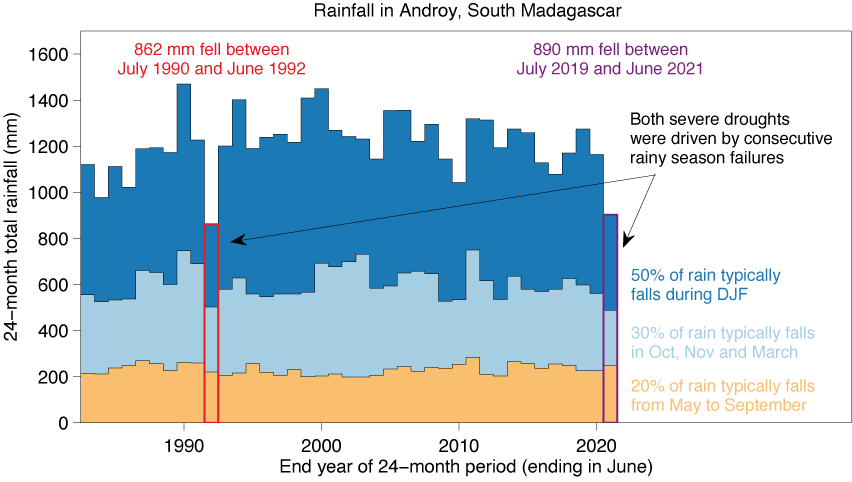Southern Madagascar (the Grand Sud) is facing a deteriorating food security crisis, exacerbated by exceptionally low levels of rainfall over the last two years. In an area with 90% of the population living below the poverty line, this recent drought has contributed to tens of thousands facing severe famine-like conditions.
Severe food insecurity is the clearest impact of the ongoing drought in Madagascar. While precipitation deficits have been widespread across the southern half of the country, we chose to focus on the region in the very south-west of the country (the Grand Sud region) for two reasons: first, this is where the humanitarian impacts are most heavily concentrated, and second, because the commonly used Köppen-Geiger climate classification shows this area to exhibit somewhat unique climatic properties.
Scientists from South Africa, Madagascar, New Zealand, India, the Netherlands, France, United States of America and the United Kingdom, collaborated to assess to what extent human-induced climate change altered the likelihood and intensity of the below-average rainfall in Southern Madagascar.
Using published peer-reviewed methods, we analysed how human-induced climate change affected the 24 month low rainfall events in the Grand Sud region of Madagascar.
 Figure 1: Schematic summary of recent 24-month rainfall totals averaged over the region of Androy in southern Madagascar, using CHIRPS rainfall data (via USGS EWX Next Generation Viewer). Coloured bars indicate which time of year is associated with different proportions of rainfall; the red and purple bars highlight the two worst rainfall deficits over a 24-month period on record: 1990-92 and the ongoing 2019-21 event.
Figure 1: Schematic summary of recent 24-month rainfall totals averaged over the region of Androy in southern Madagascar, using CHIRPS rainfall data (via USGS EWX Next Generation Viewer). Coloured bars indicate which time of year is associated with different proportions of rainfall; the red and purple bars highlight the two worst rainfall deficits over a 24-month period on record: 1990-92 and the ongoing 2019-21 event.
Main findings
Based on observations and climate modeling, the occurrence of poor rains as observed from July 2019 to June 2021 in Southern Madagascar has not significantly increased due to human-caused climate change. While the observations and models combine to indicate a small shift toward more droughts like the 2019-2021 event as a consequence of climate change, these trends remain overwhelmed by natural variability.
We chose to analyse severe rainfall deficits in this study. This was because recent research found rainfall deficits were the primary driver of drought in regions of East Africa with very similar climatic properties to south-west Madagascar.
Madagascar is one of the poorest countries of the world, with a particularly high proportion of people living below the poverty line in the south of the country. This makes it difficult for local communities to cope with any prolonged period of drought, particularly when subsistence agriculture and pastoralism in the region is rain-fed only.
Southern Madagascar has been facing a severe food security crisis, made significantly worse by well below average rainfall from July 2019 to June 2021. This exceptional drought has affected a region with high pre-existing levels of vulnerability to food insecurity, and the impacts have been compounded by COVID-19 restrictions and pest infestations.
The rainy seasons of both 2019/20 and 2020/21 saw just 60% of normal rainfall across the Grand Sud region. This lack of rain over the 24 months from July 2019 to June 2021 was estimated as a 1-in-135 year dry event, an event only surpassed in severity by the devastating drought of 1990-92.
Large scale teleconnections did not significantly alter the likelihood of witnessing these exceptional rainfall deficits in southern Madagascar. While past episodes of anomalously low rainfall in the region have indeed coincided with moderate El Niño events, the severe El Niño of 1997/98 saw average levels of rain in the region, while the rainy season of 2020/21 was exceptionally dry despite coinciding with a moderate strength La Niña event.
This result is consistent with previous research, with the IPCC’s Sixth Assessment Report concluding that any perceptible changes in drought would only emerge in this region if global mean temperatures exceed 2°C above pre-industrial levels.
Authors’ note
When we started to work on this study just two months ago Geert Jan van Oldenborgh worked with us, as always as if he was not terminally ill. He helped define the event, analysed the observational data and helped framing the study. He was not among us when it was time to check everything and draw the key conclusions. He is dearly missed not just for his wisdom, experience and integrity, but also as our friend and constant reminder why we do this.
Source link : https://www.worldweatherattribution.org/factors-other-than-climate-change-are-the-main-drivers-of-recent-food-insecurity-in-southern-madagascar/
Author :
Publish date : 2021-12-01 08:00:00
Copyright for syndicated content belongs to the linked Source.





